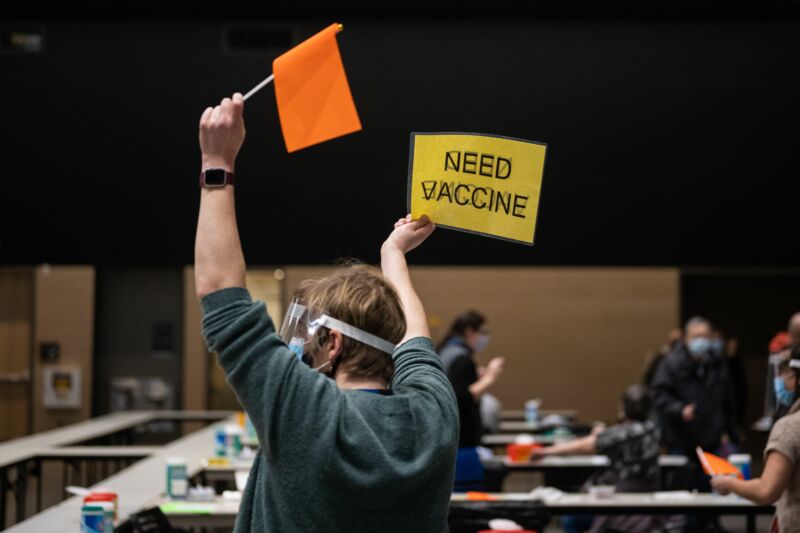
In its efforts to help Americans get vaccinated against COVID-19, the US Centers for Disease Control and Prevention is quietly working on a new website that will let people see every location in their community offering COVID-19 vaccinations, how many shots each of those locations has for the current day, and provide links to set up vaccination appointments.
That's the ideal, at least; there's a lot of work to do to get there.
Right now, the site—vaccinefinder.org—only has the full lists of vaccine providers for four states—Alaska, Indiana, Iowa, and Tennessee. Those lists include providers at hospitals, clinics, public health centers, doctor's offices, drug stores, and grocery store pharmacies.
For the rest of the country, the VaccineFinder site only includes a partial list of providers that receive vaccine directly from the federal government.
John Brownstein, VaccineFinder founder and chief information officer at Boston Children's Hospital, told NPR that more vaccine providers in more states are "expected to join in the coming days and weeks."
In the meantime, Brownstein and others will work out the kinks of the site and test how it might hold up under heavy traffic. Similar sites set up by volunteers and individual states have been inundated with people seeking the coveted vaccines. With vaccine eligibility far outpacing the vaccine supply, the pursuit of scarce doses has led to frustrating glitches and crashes on the few vaccination sign-up sites that already exist. Such was the case for Massachusetts' VaxFinder site, which crashed last week after about a million residents became newly eligible for a COVID shot and rushed to sign up.
The CDC's VaccineFinder site aspires to dodge that fate and be a central, streamlined resource for people wanting to sign up for their shot.
Work to do
"The idea is to show where COVID-19 vaccine providers [are] that are open to the public—how to contact them, how to book an appointment, and try to show the daily inventory status so people are clear where there's vaccine and where there isn't," Brownstein said.
Brownstein and his team have a decent history of doing that. The site—built up from a collaboration between the CDC, Boston Children's Hospital, and recently, subcontractor CastLight—dates back to the H1N1 pandemic in 2009. Since then, the site has functioned as a resource for people looking for all sorts of vaccinations, including seasonal flu shots
But realizing that goal for COVID-19 will take more than just getting more vaccine providers and states online. People will still have to navigate state-specific rules and procedures for eligibility, registration, wait-listing, and appointments. The site also relies on the providers to accurately and consistently report how much inventory they have every 24 hours. There are reportedly more than 110,000 providers across 64 US jurisdictions. Only about 29,000 providers are currently plugged into the CDC's VaccineFinder.
Still, Brownstein is optimistic and ambitious about the site's future. He added that, after the site is fully operational, they plan to share data with third parties, allowing people to find the site's vaccine availability data on sites like Google Maps and Waze. "So it's not just about coming to the website, but meeting consumers where they are and making sure that anybody who's looking for a vaccine knows where to find them," he said.
All of those capabilities will have to be worked out quickly as the pace of vaccine distribution and vaccination is expected to speed up. Earlier this month, US President Joe Biden announced new deals with Pfizer and Moderna for 200 million additional vaccine doses by the end of July. On top of earlier deals and expedited delivery agreements, that puts the country on track to have enough doses to vaccinate 300 million Americans—600 million doses—by the end of July, which is just months away.
reader comments
62